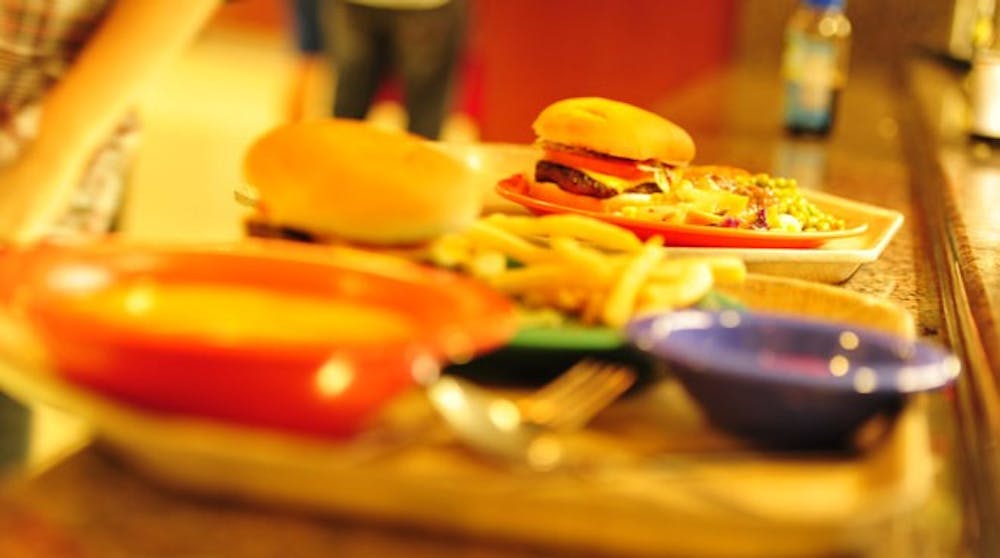For first-year and transfer students, Sept. 10 marked the first run-in with Trayless Fridays at the Heilman Dining Center.
Confusion set in as they approached the islands that normally hold trays. Frustration and fear gripped them as they tried to balance glasses of milk, utensils and plates piled high with fried chicken, macaroni and cheese and jersey dirt.
"Why?" cried one student, before finding the stash of trays left off to the side for the less tolerant.
The answer: because the positive impact that Trayless Fridays have on waste is undeniable. In a waste survey conducted by D-Hall's management last year, six Trayless Fridays were found to have saved 819 pounds of waste. That's on the upper end of what an entire day's worth of food waste at D-Hall could be, according to the survey.
"When we go trayless, the reality is that people put less on their plates," said Dee Hardy, associate vice president of campus services.
"It's harder to load your tray up and go sit down and then realize that your eyes were bigger than your stomach. It's a conscious thought process to go back to get more if you want it."
But on trayless days, an average of 11 percent of customers choose to use trays anyway, according to the study.
"For me, it's just not convenient," said Samantha Frandsen, a sophomore, who used a tray on Friday. "I only had half an hour to eat and I didn't have time to go back up three times."
However, Frandsen finished all the food on her tray.
Hardy said that was all she asked.
"Take all you want," she said, "but eat all you take."
Food left on customers' trays was by far the largest component of waste at D-Hall, said Jerry Clemmer, director of residential dining.
Enjoy what you're reading?
Signup for our newsletter
And it's not only an environmental issue: wasted food is wasted money, and that means less to spend on ordering quality ingredients and putting on special events like sushi night and Midnight Munchies, Clemmer said.
As for the leftovers on the other end - food left in serving bins at the end of a meal - production manager David Bevan ensures they are kept to a minimum.
"Our real goal is to not have any leftovers," Hardy said.
Bevan records the amount of food left in the bins at the end of each meal and uses that to refine projections for how much to make next time. D-Hall employees also batch-cook at almost every station, meaning they cook a smaller number of portions at a time, making the margin for error smaller.
Sometimes, bins of food that never made it to a serving station can be reinvented at the next meal: Scrambled eggs are re-used in fried rice, baked potatoes become wedge fries and vegetables are re-used in soups.
Untouched trays of food can be safely saved for next time thanks to D-Hall's "blast chiller," which quickly chills food with high-tech fans, probes and an ultraviolet light that scans for bacteria.
The Heilman Dining Center also donates untouched leftovers to the Virginia Food Bank five to 10 times per semester, Clemmer said.
But some waste is unavoidable. Food safety is something D-Hall's management takes very seriously, and if a bin has been set out at a serving station or has been at room temperature for too long, it must be thrown away.
According to data provided by Bevan, this adds up to several half-pans of sauce, pasta, rice and stir-fry at the end of the day. It's minimal when compared to the amount of food left on customers' trays, Hardy said.
"This is the best kitchen I've worked in for how much waste it produces," kitchen manager Michael Onorato said, "and I've been working in kitchens for over 20 years now. It's something to be proud of."
Contact reporter Ali Eaves at ali.eaves@richmond.edu
Support independent student media
You can make a tax-deductible donation by clicking the button below, which takes you to our secure PayPal account. The page is set up to receive contributions in whatever amount you designate. We look forward to using the money we raise to further our mission of providing honest and accurate information to students, faculty, staff, alumni and others in the general public.
Donate Now



